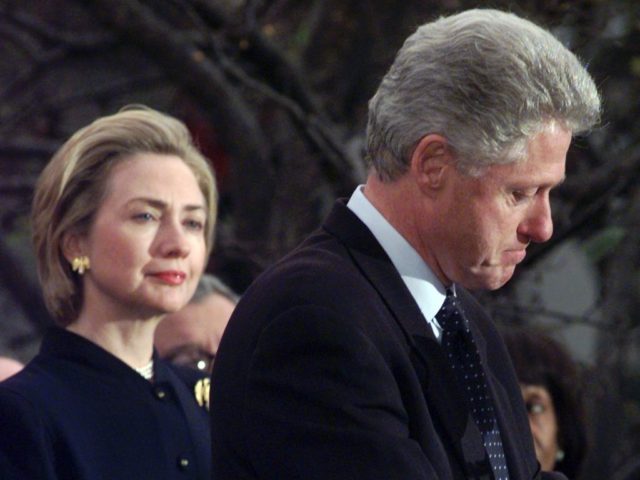28 newly-declassified pages of the 2002 Congressional Joint Inquiry into the Sept. 11 attacks reveals that much of the evidence tying the government of Saudi Arabia to Al Qaeda and other jihadist groups surfaced during the tenure of President Bill Clinton, and that FBI and CIA agents found themselves unable to act upon it. Their inaction, the report concludes, was “unacceptable.”
The highly-redacted pages of the report quote FBI and CIA agents expressing frustration that the government of Saudi Arabia had been “useless and obstructionist for years” in providing intelligence on jihadist activity, and notes that the Saudi government had ties to multiple “charities” and non-governmental organizations dating back to the 1990s that aroused suspicion of jihadist activity.
In one example, the report cites “a veteran New York FBI agent” who told them that “from his point of view, the Saudis have been useless and obstructionist for years.” The report later quotes an unidentified official of either the CIA or FBI highlighting “the Saudi Government’s longstanding support for very fundamentalist Wahabi and Salafi charities and movements around the world, which in a sense you see the money is going to fundamentalists and you would be very surprised if some of it doesn’t bleed over into terrorist support.”
The December 2002 report condemns the fact that “only recently” had both agencies begun to investigate individuals who appeared to be receiving payment from the Saudi government and also had close ties to the 9/11 hijackers (emphasis added).
The FBI and CIA have informed the Joint Inquiry that, since the September 11 attacks, they are treating the Saudi issue seriously, but both still have only a limited understanding of the Saudi Government’s ties to terrorist elements.
Only recently, and at least in part due to the Joint Inquiry’s focus on this issue, did the FBI and CIA establish a working group to address the Saudi issue. In the view of the Joint Inquiry, this gap in U.S. intelligence coverage is unacceptable, given the magnitude and immediacy of the potential risk to U.S. national security. The Intelligence Community needs to address this area of concern as aggressively and as quickly as possible.
While the report does not specifically mention the administrations of either George W. Bush or Bill Clinton, it makes clear through various examples of Saudi ties to Al Qaeda that illicit activity was taking place during the Clinton administration, with the FBI and CIA doing little to monitor it.
“It was clear from 1996 that the Saudi Government would not cooperate with the United States on matters relating to Usama bin Laden,” the report reads, going on to cite a number of examples of suspect activity tied to Saudi Arabia in the Clinton era that went unmonitored:
- The King Fahad mosque in Culver City, CA, which was built with Saudi money in 1998, was “widely recognized for its anti-Western views” but not investigated for ties to jihadist groups.
- An individual “with ties to the Saudi royal family,” whose name is redacted in the report, was known to have discussed “the possibility of infiltrating individuals into the United States in 1998”
- Another individual, Mohammed al-Qudhaeein, was believed to have attempted a “dry-run” attempt to storm the cockpit of a commercial airliner in 1999.
- The FBI became aware of a money laundering scheme in 1998 shipping money from “the Somali community in San Diego to Al Barakaat Trading Company and other businesses affiliated with Usama bin Laden.” It was only after the September 11 attacks that the FBI found evidence of Saudi involvement there.
- Omar al-Bayoumi, a man who “provided substantial assistance” to two hijackers as early as February 2000, “may be a Saudi intelligence officer,” according to evidence dating back to 1999. He worked for the Saudi Civil Aviation Administration between 1976 and 1993.
- In 1998, the Saudi government wrote al-Bayoumi a letter of recommendation to enter higher education in the United States.
- Osama Bassnan, another suspect of having ties to both the Saudi government and the September 11 attacks, “hosted a party for the Blind Shaykh at his house in Washington, DC in October 1992.” The Blind Shaykh is an Egyptian jihadist with close ties to Osama Bin Laden and a pedigree from Egypt’s Al-Azhar University, the most prestigious theological institution in Islam.
- As early as 1998, the CIA identified the NGO the World Arab Muslim Youth Association, run by Abdullah Bin Laden, Osama bin Laden’s nephew, “provides funding, logistical support and training with possible connections to… Hamas, Algerian extremists, and Philippine militants.”
The report does not speculate as the what the CIA or FBI did with these leads during the Clinton administration, only noting that they appeared to yield no action to stop numerous plots to fund groups like Al Qaeda and support the September 11 hijackers.

COMMENTS
Please let us know if you're having issues with commenting.